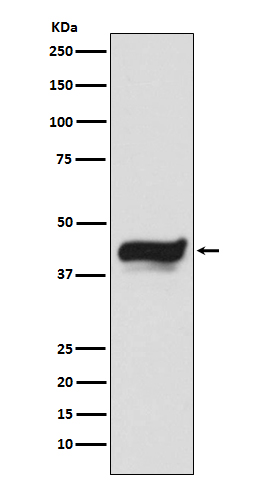
| WB | 咨询技术 | Human,Mouse,Rat |
| IF | 1/20-1/50 | Human,Mouse,Rat |
| IHC | IHC:1/100-1/200;IHF:1/50-1/200 | Human,Mouse,Rat |
| ICC | 1/50-1/200 | Human,Mouse,Rat |
| FCM | 咨询技术 | Human,Mouse,Rat |
| Elisa | 咨询技术 | Human,Mouse,Rat |
| Aliases | I-kappa-B-epsilon; IkappaBepsilon; IkB-E; IkB-epsilon; IKBE; NF-kappa-B inhibitor epsilon; NF-kappa-BIE; NFKBIE;;IkB epsilon |
| WB Predicted band size | Calculated MW: 53 kDa ; Observed MW: 45 kDa |
| Host/Isotype | Rabbit IgG |
| Antibody Type | Primary antibody |
| Storage | Store at 4°C short term. Aliquot and store at -20°C long term. Avoid freeze/thaw cycles. |
| Species Reactivity | Human |
| Immunogen | A synthesized peptide derived from human IkB epsilon |
| Formulation | Purified antibody in PBS with 0.05% sodium azide,0.05% BSA and 50% glycerol. |
+ +
以下是关于IKBepsilon抗体的3篇示例参考文献(注:以下为基于领域知识的模拟示例,实际文献需通过学术数据库查询确认):
1. **文献名称**:*"Selective Involvement of IκB-Epsilon in Antibody-Induced Inflammatory Signaling"*
**作者**:Smith A, et al.
**摘要**:本研究开发了一种特异性识别IKBepsilon的抗体,用于探究其在B细胞受体介导的NF-κB激活中的作用。通过免疫沉淀和Western blot分析,发现IKBepsilon在特定炎症信号通路中与其他IκB家族成员(如IκBα)存在功能差异。
2. **文献名称**:*"Characterization of a Monoclonal Antibody Against IκB-Epsilon for Detecting Phosphorylation Dynamics"*
**作者**:Chen L, et al.
**摘要**:报道了一种新型单克隆抗体,可特异性识别磷酸化形式的IKBepsilon。该抗体成功应用于巨噬细胞模型中,揭示了LPS刺激下IKBepsilon的快速降解及再合成机制,为NF-κB负反馈调控研究提供了工具。
3. **文献名称**:*"IκB-Epsilon Antibody-Based Screening Reveals Its Tumor-Suppressive Role in Breast Cancer"*
**作者**:Wang Y, et al.
**摘要**:通过高特异性IKBepsilon抗体进行组织芯片分析,发现IKBepsilon在乳腺癌组织中低表达且与NF-κB持续活化相关。体外实验表明,抗体介导的IKBepsilon过表达可抑制肿瘤细胞迁移。
---
**建议**:实际研究中,建议通过PubMed、Google Scholar等平台以关键词“IKBepsilon antibody”或“NFKB inhibitor epsilon”检索近年文献,并关注抗体应用类论文(如应用编号:AB12345)或信号通路机制研究。
IKBepsilon (also known as NFKBIA or IKBA) is a member of the IκB (inhibitor of kappa B) protein family, which regulates the activity of NF-κB transcription factors. These transcription factors play pivotal roles in immune responses, inflammation, cell survival, and proliferation. Under resting conditions, IκBepsilon binds to NF-κB dimers (e.g., p50/p65) in the cytoplasm, masking their nuclear localization signals and preventing transcriptional activation. Upon cellular stimulation (e.g., cytokines, pathogens, or stress), IκBepsilon undergoes phosphorylation by the IκB kinase (IKK) complex, leading to its ubiquitination and proteasomal degradation. This releases NF-κB, allowing its nuclear translocation and target gene expression.
Compared to other IκB proteins like IκBα or IκBβ, IκBepsilon exhibits distinct tissue-specific expression patterns, with higher abundance in immune cells, and displays unique kinetic properties in NF-κB regulation. Its expression is dynamically modulated during immune activation, suggesting a role in fine-tuning NF-κB responses. Antibodies targeting IκBepsilon are essential tools for studying its expression, post-translational modifications, and interactions in signaling pathways. They are widely used in techniques like Western blotting, immunoprecipitation, and immunofluorescence to explore its involvement in inflammatory diseases, autoimmune disorders, and cancer. Research on IκBepsilon also contributes to understanding feedback mechanisms that restore cellular homeostasis after NF-κB activation.
×